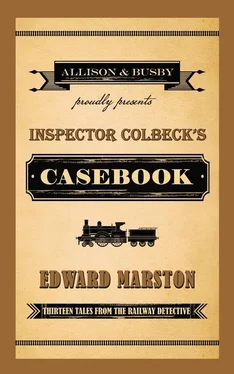Edward Marston - Inspector Colbeck's Casebook
Здесь есть возможность читать онлайн «Edward Marston - Inspector Colbeck's Casebook» весь текст электронной книги совершенно бесплатно (целиком полную версию без сокращений). В некоторых случаях можно слушать аудио, скачать через торрент в формате fb2 и присутствует краткое содержание. Год выпуска: 2014, ISBN: 2014, Издательство: Allison & Busby, Жанр: Исторический детектив, на английском языке. Описание произведения, (предисловие) а так же отзывы посетителей доступны на портале библиотеки ЛибКат.
- Название:Inspector Colbeck's Casebook
- Автор:
- Издательство:Allison & Busby
- Жанр:
- Год:2014
- ISBN:9780749014742
- Рейтинг книги:4 / 5. Голосов: 1
-
Избранное:Добавить в избранное
- Отзывы:
-
Ваша оценка:
- 80
- 1
- 2
- 3
- 4
- 5
Inspector Colbeck's Casebook: краткое содержание, описание и аннотация
Предлагаем к чтению аннотацию, описание, краткое содержание или предисловие (зависит от того, что написал сам автор книги «Inspector Colbeck's Casebook»). Если вы не нашли необходимую информацию о книге — напишите в комментариях, мы постараемся отыскать её.
Inspector Colbeck's Casebook — читать онлайн бесплатно полную книгу (весь текст) целиком
Ниже представлен текст книги, разбитый по страницам. Система сохранения места последней прочитанной страницы, позволяет с удобством читать онлайн бесплатно книгу «Inspector Colbeck's Casebook», без необходимости каждый раз заново искать на чём Вы остановились. Поставьте закладку, и сможете в любой момент перейти на страницу, на которой закончили чтение.
Интервал:
Закладка:
His gaze then alighted on the altar and he froze in horror. Stretched out in front of it was the body of a man. His head had been smashed open and was soaked in blood. He lay there like some grotesque sacrifice. It was too much for Gillard. He gasped, tottered then fell forward into oblivion.
The Sabbath was no day of rest for the detectives at Scotland Yard. If an emergency arose, they had to respond to it. Robert Colbeck and Victor Leeming had each attended services at their respective parish churches, only to return home to an urgent summons from their superintendent. Edward Tallis told them everything that could be gleaned from the telegraph he’d received from Wolverton, then he dispatched them there. An unwilling rail traveller on weekdays, Leeming was even gloomier when he was forced to catch a train on a Sunday.
‘I’d hoped to spend some time with my children,’ he moaned.
‘I, too, had other plans,’ said Colbeck.
‘It’s unfair on Estelle. She looks after them during the week. It’s only right that I do my share whenever I can.’
‘Police work often occurs at inconvenient hours, Victor. It can be irritating but we must try to see it from the point of view of the victim. He didn’t get himself killed on a Sunday morning specifically to ruin our leisure time with the family.’
‘Why bother us?’ asked Leeming. ‘This is a case for the local constabulary.’
‘Because they’re aware of our reputation, the LNWR asked for us by name. Doesn’t that make you feel proud?’
‘No, sir, it makes me feel annoyed. We’re being imposed upon.’
‘This murder has a unique distinction.’
‘Yes, it’s made me miss the best meal of the week with the family.’
‘Take a less selfish view,’ advised Colbeck. ‘The crime took place in the first church ever built by a railway company.’
‘If you ask me,’ grumbled Leeming, ‘the railways are a crime in themselves.’
Colbeck laughed. ‘That’s precisely why I don’t ask you, Victor. Tell me,’ he went on, ‘are your children still playing with the toy train I bought them?’
‘That’s different, sir.’
‘Are they?’
‘Yes,’ said Leeming, reluctantly. ‘They play with nothing else.’
‘So the railway does have a useful purpose, after all.’
‘They’re too young to understand.’
‘And you’re far too old not to understand its value to us.’ He became serious. ‘A man has been slaughtered in a church — and on a Sunday. Doesn’t that make you want to track down the killer?’
‘It does, sir,’ said Leeming, roused. ‘What he did was unforgivable.’
When a brutal murder took place, there was, as a rule, universal sympathy for the victim. That was not the case with Claude Exton. Staff on duty at Wolverton station all knew and loathed the man. More than one of them seemed pleased at the news that he was dead. What they did do was to provide useful background details for the detectives. Leeming recorded them in his notepad. Exton was an unpopular member of the community, a shiftless man of middle years who lurched from one job to another. He’d been banned from one pub for causing an affray and was thrown out of another for trying to molest the landlord’s wife. Other outrages could be laid at Exton’s door.
‘In other words,’ said Leeming, ‘he was a real reprobate.’
‘That’s putting it kindly,’ muttered the stationmaster.
‘Was he a churchgoer?’ asked Colbeck.
‘No, Inspector. He always boasted that the only time they’d get him across the threshold of a church was for his funeral. It seems he was right about that.’
The collective portrait of the deceased was unflattering but it gave them a starting point. Colbeck and Leeming walked swiftly to the church. Everyone had heard the news. People were standing outside their houses discussing the murder with their neighbours. A noisy debate was taking place on a street corner. There was a small crowd outside the church itself and a uniformed policeman was blocking entry to the building. When he saw them approach, the vicar guessed that they must be the detectives and he rushed across to introduce himself. In the circumstances, the Reverend John Odell was surprisingly composed. He was a short, tubby man in his fifties whose normally pleasant features were distorted by concern.
‘This is an appalling crime,’ he said. ‘A church is supposed to be a place of sanctuary against the evils of the world. I thank God that I got here early enough to stop any of my parishioners seeing that hideous sight.’
‘Were you the first to discover the body?’ asked Colbeck.
‘No, Inspector. That gruesome task fell to the warden, Simon Gillard. When I arrived here with the sacristan, we found the poor fellow prostrate in the aisle. He’d fainted and injured his head as he hit the floor.’
‘We’ll need to speak to him.’
‘Then you’ll have to go to his house. As soon as he’d recovered, I had him taken straight home. Then I sent for the police.’
‘Is the body still inside the church?’ wondered Leeming.
‘Yes, it is,’ replied Odell. ‘I want it moved as soon as possible, obviously, but I thought you might prefer to see it exactly as it was found. Claude Exton was not a churchgoer but he nevertheless deserves to be mourned. Since we couldn’t use the church, I conducted a very short, impromptu service out here and we prayed for the salvation of his soul. Then I urged the congregation to disperse to their homes but, as you see, the news has attracted people of a more ghoulish disposition.’
‘Human vultures,’ murmured Leeming. ‘We always get those.’
‘I’m assuming that the warden unlocked the church this morning,’ said Colbeck. ‘Who else has a key?’
‘Well, I do, naturally,’ said Odell, ‘and so does the other warden but he’s ill at the moment. Between us, we hold the only three keys.’
‘So how did the killer and his victim get inside the church?’
‘That’s what puzzles me, Inspector. It was locked overnight.’
‘Is it conceivable that any of the keys went missing?’
‘Oh, no,’ said Odell, firmly. ‘The other warden and I are extremely careful with our keys and Simon Gillard is so dutiful that I wouldn’t be surprised if he takes his to bed with him. How two people got inside the church is a mystery. Only one, alas, came out alive.’
After plying the vicar with some more questions, the detectives asked the policeman to let them into the church. He stood aside so that they could open the door. Some of those lingering nearby edged forward to take a peek but Colbeck shut the door firmly behind him. The atmosphere inside the church was eerie. It was quite warm outside but both of them shivered involuntarily. Consecrated ground had been violated by a foul murder. There was a strange sense of unease. They walked down the nave and into the chancel to view the body. Though both of them had seen many murder victims, they were shocked. Colbeck was also curious.
‘What does it remind you of, Victor?’ he asked.
‘That man in Norwich, sir,’ said Leeming. ‘He’d been battered to death with a sledgehammer. His head was just like pulp.’
‘Look at the way the body has been arranged in front of the altar.’
‘That’s just the way he fell.’
‘I don’t think so. There’s something almost … artistic about it.’
Leeming frowned. ‘Is there?’
‘It’s reminiscent of those medieval paintings that depict the slaughter of Thomas Becket. He was hacked down in front of the altar by four knights who thought they were doing the king’s bidding.’
‘It doesn’t look like that to me, sir. And if what they say is true, he’s certainly no saint like Becket. Exton was a real sinner.’
Читать дальшеИнтервал:
Закладка:
Похожие книги на «Inspector Colbeck's Casebook»
Представляем Вашему вниманию похожие книги на «Inspector Colbeck's Casebook» списком для выбора. Мы отобрали схожую по названию и смыслу литературу в надежде предоставить читателям больше вариантов отыскать новые, интересные, ещё непрочитанные произведения.
Обсуждение, отзывы о книге «Inspector Colbeck's Casebook» и просто собственные мнения читателей. Оставьте ваши комментарии, напишите, что Вы думаете о произведении, его смысле или главных героях. Укажите что конкретно понравилось, а что нет, и почему Вы так считаете.












